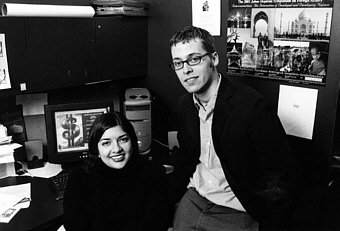|
|
Speakers to Look at 'Capitalism in Contemporary World'By Glenn SmallHomewood |

U.S. Sen. Russell Feingold, a Democrat from Wisconsin and a member of the Senate Foreign Relations Committee, comes to Homewood next Monday, March 4, as the first speaker in the Johns Hopkins 2002 Symposium on Foreign Affairs.
The student-organized symposium enters its fifth year featuring nine speakers at seven events during March and April and focuses on the theme "Paragon or Paradox? Capitalism in the Contemporary World."
Topics range from human rights to the environment to medicine to terrorism, and speakers include the Pakistani ambassador to the United States, the founder of the Rainforest Action Network, the executive director of Amnesty International U.S.A. and the former chief weapons inspector to Iraq.

|
| Seniors Zainab Akbar and Brandon Yoder are co-chairs of this year's Symposium on Foreign Affairs, which will address the effects of capitalism on issues such as the environment, gender and race. |
The co-chairs of the event are seniors Zainab Akbar, an anthropology major, and Brandon Yoder, an international relations major, both in the Krieger School of Arts and Sciences.
"I think we have a very solid symposium," Akbar said. "It draws on a lot of issues that are going on in the world. Environmental, social, racial, class and gender issues have a lot to do with capitalism and capitalist institutions.
"Whether or not you agree with capitalism, it's important to understand that it drives a lot of things and to analyze that," she said.
Feingold, who chairs the Senate's Africa subcommittee, will look at the matter of power vacuums in post-Cold War Africa and what the United States can do about it.
Benjamin Barber, author and political theorist, will talk about how capitalism may have fueled terrorism and what remedies might be available.
As executive director of Doctors Without Borders, Nicholas de Torrente will talk about the challenge of providing access to medical care and how that relates to capitalism.
What might prove most interesting, and relevant, is a panel discussion on the United States and Iraq. The Bush administration this spring is pressuring Iraq to allow weapons inspectors inside that country for the first time in three years. The discussion will feature Scott Ritter, former U.N. chief weapons inspector to Iraq; Edward Peck, former chief of mission at the U.S. Embassy in Baghdad; and Erik Gustavson, director of the Education for Peace in Iraq Center.
Other symposium speakers will be William Schulz, executive director of Amnesty International U.S.A.; Maleeha Lodhi, the Pakistani ambassador to the United States; and Randall Hayes, president of the Rainforest Action Network.
All events are free and open to the public. For more information, call 410-516-8214.
|
Monday, March 4
Thursday, March 7
Thursday, March 14
Thursday, March 28
Thursday, April 4
Wednesday, April 10
Wednesday, April 17 |
| GO TO FEBRUARY 25, 2002 TABLE OF CONTENTS. |
| GO TO THE GAZETTE HOME PAGE. |